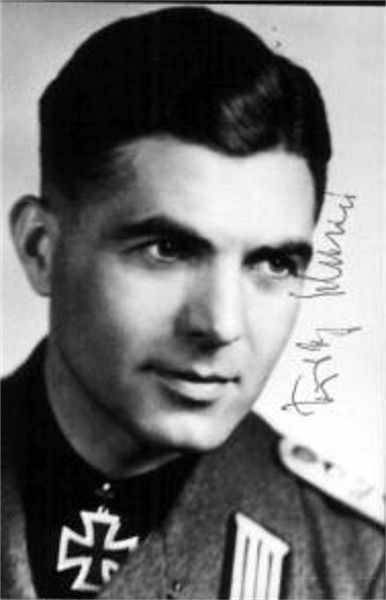Scherer, Friedrich 'Fritz' (Sturmgeschütz-Abt.236)
- Date of birth:
- August 26th, 1910 (Mannheim/Baden, Germany)
- Date of death:
- May 8th, 1998 (Adenau/Rhineland-Palatinate, Germany)
- Nationality:
- German (1933-1945, Third Reich)
Biography
Do you have more information about this person? Inform us!
- Period:
- Second World War (1939-1945)
- Awarded on:
- 1940
- Period:
- Second World War (1939-1945)
- Awarded on:
- December 6th, 1941
- Period:
- Second World War (1939-1945)
- Period:
- Second World War (1939-1945)
- Awarded on:
- April 30th, 1942
- Period:
- Second World War (1939-1945)
- Period:
- Second World War (1939-1945)
- Awarded on:
- 1942
- Period:
- Second World War (1939-1945)
- Rank:
- Oberleutnant (1st Lieutenant)
- Unit:
- Sturmgeschütz-Abteilung 189, Heer
- Awarded on:
- November 13th, 1942
- Period:
- Second World War (1939-1945)
- Rank:
- Hauptmann (Captain)
- Unit:
- Chef, 2. Batterie, Sturmgeschütz-Abteilung 236, Heer
- Awarded on:
- October 7th, 1943
- Period:
- Second World War (1939-1945)
- Rank:
- Hauptmann (Captain)
- Unit:
- Chef, 2. Batterie, Sturmgeschütz-Abteilung 236, Heer
- Awarded on:
- December 14th, 1943
“The order for the battalion was this: To assist the hard-fought 16. Pz.Gren.Div. in its defense against strong enemy forces from the north and northeast (supported by aircraft, tanks and artillery) in order to maintain its positions on the high ground 1 km north of Kalinowka and 2 km north of Ssemenowksi (11 km north of Kuibyshevo). The ultimate goal is to prevent an enemy breakthrough.
On 20.07.1943 the battalion was unloaded at the railway station at Amwrossijewka and on the next day already found itself on the battlefield, being employed along a broad front to counterattack the broken-in enemy. In a very short time the said high ground was back in friendly hands. Hauptmann Scherer held the main share of this victory thanks to his dashing leadership.
The order for the Batterie on 22.07.1943 was this: To secure Hill 196.0 and the area to the south of it.
When the armoured masses of the enemy launched a surprise attack from the north, Hauptmann Scherer took control of the situation with cold blooded determination. He decided to let the enemy tanks to come into a favourable range and then, as if on a parade ground, gave his orders to the battery which was firmly under his control. During the course of the engagement, as rearward moving friendly infantry caused confusion and threatened to cause a panic, he disembarked from his Sturmgeschütz, took control of the disorganized friendly units, and was able to assuage the tank terror that had set in through his superior calmness. All alone, he decided on his own initiative to counterattack with the infantry forces he’d gathered up despite having no obligation to do so. With exemplary bravery he was able to dominate the battlefield. Despite the lack of support he drove forward with his comrades, crushed the foremost enemy foxholes, rolled over and destroyed several dug-in enemy AT guns, and was from the newly conquered territory able to acquire a commanding view of an open area that would be of major help in dealing with the still oncoming enemy tanks.
This action was decisive for what would be a major German defensive success, with a total of 52 enemy tanks being destroyed by his 2. Batterie on this day (of which Scherer personally participated in destroying 13). Not only this but the success here was pivotal in bringing the enemy attack along the whole front to a halt, and thus prevent an enemy breakthrough with potentially disastrous consequences.
During the operations of the following days, Hauptmann Scherer would continue to lead his Batterie with distinction. He and his men contributed significantly to the stabilizing of the overall situation, and the fact that the battalion was able to destroy a total of 139 enemy tanks in just 4 days.
Hauptmann Scherer - who has already been awarded the German Cross in Gold - is without doubt a highly-valued officer, a powerful personality and an experienced Batterie commander. He is in every way worthy of the high award of the Knight’s Cross to the Iron Cross.”
- Period:
- Second World War (1939-1945)
Sources
- Photo 1: Willi Schumacher Collection
- - FELLGIEBEL, W.P., Elite of theThird Reich, Helion & Company Limited, Solihull, 2003.
- PATZWALL, K. & SCHERZER, V., Das Deutsche Kreuz 1941-1945, Verlag Klaus D. Patzwall, Norderstedt, 2001.
- THOMAS, FRANZ & WEGMANN, GÜNTER, Die Ritterkreuzträger der Deutschen Wehrmacht 1939-1945, Biblio-Verlag, Osnabrück, Germany, 1985.
- WENDT, KURT, Wir Für Alle, Hamburg, 1996.
- Scheibert, Horst. Die Träger der Ehrenblattspange des Heeres und der Waffen-SS/ Die Träger der Ehrentaffelspange der Kriegsmarine/ Die Inhaber des Ehrenpokals für Besondere Leistung im Lukftkrieg. Friedberg, Ger.: Podzun-Pallas Verlag, 1986, ISBN 3-7909-0283-7
- Axis History Forum via Awardholders / unit
- die-sturmartillerie.com
- das-ritterkreuz.de













